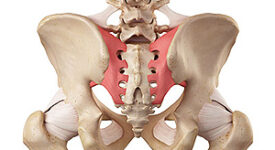Upper back pain at night can be a frustrating and disruptive issue. It can significantly enhance sleep quality and general well-being by comprehending the causes and developing workable solutions. Poor sleeping, a painful mattress, and the wrong pillows are possible causes of upper back pain at night.
Unhealthy sleeping positions are a frequent cause of upper back pain at night. Uncomfortable sleeping positions can cause stress on the upper back’s muscles and joints. As an illustration, consider sleeping on your stomach or providing insufficient support for your neck and shoulders. It is crucial to pick a pillow that supports the head and neck while preserving optimal spinal alignment. People with upper back pain at night are frequently advised to use memory foam pillows or ones with adjustable loft height options.

Common Causes of Upper Back Pain at Night
An irritating and uncomfortable situation is waking up in the middle of the night with upper back pain. Even if this is a common problem, it is essential to identify the root reasons and practical fixes to get a good night’s sleep and maintain your general well-being. We’ll look at some potential causes of upper back pain in this post, along with some doable treatments to help you feel better at night.
- Poor Sleeping Position: One of the leading causes of upper back pain at night is your sleeping position. The muscles in your upper back and spine can become strained from sleeping in an uncomfortable position, which can cause pain. For instance, sleeping on your stomach can unnecessarily strain your neck and upper back.
- Muscular strain: Your upper back muscles may get sore from daytime stress and anxiety, especially if you spend the night lying still. Muscle ache from tension is a common cause of upper back pain at night.
- Symptoms of Underlying Medical Conditions: Upper back discomfort at night may occasionally indicate an underlying medical issue. Herniated discs, osteoarthritis, and scoliosis are a few conditions that might get worse when you lie down and cause nocturnal pain.
- Overuse or Strain: Throughout the day, repetitive motions or heavy lifting can cause your upper back muscles to become strained. This strain cannot become noticeable until you’re at rest, like when sleeping.
Solutions for Managing Upper Back Pain at Night
- Change Your Resting Position: Take a stab at dozing on your back or side with a cushion that upholds your neck and keeps an unbiased spine arrangement. Avoid resting on your stomach, as it can strain your upper back and neck.
- Put resources into a Quality Sleep cushion and Pad: Pick a bedding pad that offers legitimate help for your body and guarantees your spine is adjusted. Adaptive padding and plastic sleeping cushions are known for their capacity to shape your body and keep up with excellent spinal arrangements.
- Clinical Assessment: If your upper back’s aggravation around evening time is serious, determined, or joined by other concerning side effects, counseling a medical care professional is fundamental. They can perform analytical tests and suggest fitting treatment choices for your condition.

Exploring the Phenomenon of Upper Back Pain at Night
Many things might lead to upper back pain at night, from poor posture and muscular tension to underlying medical issues. The unfortunate resting stance is one potential reason for upper back pain around evening time. At this point, when you rest in an abnormal position, it can strain your muscles, prompting distress and solidness. To further develop your rest act, utilize a strong pad that adjusts your neck and spine. Moreover, consider putting resources into a sleeping cushion that offers sufficient help for your back. If your mattress and pillow do not provide enough support for your spine, this could cause your upper back pain. A bed that is too soft or firm or a pillow that doesn’t sufficiently support your neck as you sleep can hurt.
Another contributing element might be muscle pressure or abuse. If you spend extended periods sitting in a work area or participating in redundant exercises, it’s no big surprise that your upper back muscles might feel resisted at night. Enjoy customary reprieves to extend, rehearsing excellent ergonomics, and integrating practices that focus on the upper back can assist with lightening this pressure.
Taking Steps towards a Good Night’s Sleep without Upper Back Pain
Now is the ideal time to make a few strides towards further developing your rest quality and mitigating that inconvenience. The following are a couple of tips to assist you with accomplishing a tranquil night without upper back pain:
- Invest in a supportive mattress: Decent bedding can significantly improve back pain. Search for medium-solid bedding that gives legitimate spinal arrangement and supports your upper back. Adaptable padding or plastic sleeping cushions frequently offer significant tension alleviation.
- Choose the right pillow: A cushion that sufficiently upholds your neck and upper back can decrease torment. Settle on a pad with medium space, neither too high nor excessively level, to keep up with legitimate arrangements while you rest.
- Practice a great resting stance: Rest in a place that upholds your upper back. If you’re a side sleeper, place a cushion between your knees to adjust your spine accurately. Back sleepers might profit from putting a little pillow or rolled-up towel under their lower back for added help.
- Stretch before bed: Delicate extending practice before sleep time can assist with loosening up tense muscles and further develop adaptability. Zero-in opens that focus on the upper back include shoulder rolls, neck stretches, and chest openers.
- Use heat treatment: Applying intensity to the upper back can mitigate muscle strain and advance unwinding. You can utilize a warm cushion, warm towel, or scrub down before bed to ease any aggravation or firmness.
- Consider ergonomic changes: Investigate your resting climate and make any essential improvements. Guarantee that your cushions, bedding, and dozing position all advance appropriate spinal arrangement and limit stress on your upper back.
- Talk to medical care proficient: On the off chance that your upper back torment perseveres, regardless of attempting these tips, looking for clinical guidance from a medical services professional is fundamental. They can assess your condition, give customized suggestions, and address any hidden issues causing the aggravation.

Conclusion:
You can lessen or eliminate nocturnal discomfort and resume getting a good night’s sleep by figuring out the root reasons and putting workable measures in place.
Finally, improper sleeping positions, an uncomfortable bed, and insufficient pillows can all contribute to upper back pain at night. People can relieve nighttime upper back discomfort and get more comfortable sleep by addressing these issues and making the required adjustments.
In conclusion, don’t let nighttime upper back pain disrupt your sleep any longer! By making minor adjustments like modifying your sleep position, investing in a supportive mattress, and incorporating posture correction exercises into your routine – you’ll be well on your way to relieving this uncomfortable issue. Retake control of your nights and wake up feeling refreshed and pain-free. Remember that everyone’s situation is unique, so it’s essential to consult with a healthcare professional if your symptoms persist or worsen over time.









